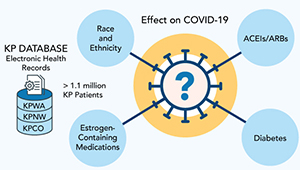Susan Shortreed, PhD
Biography
Susan Shortreed, PhD, uses statistics and machine learning methods to address health science problems, with a special emphasis on analyzing complex longitudinal data. She develops and evaluates statistical approaches for observational data, and works to improve the design and analyses of studies that use data collected from electronic health care records. She is leading a project to develop statistical methods for constructing personalized treatment strategies using data captured from electronic health records.
Dr. Shortreed earned her PhD in statistics from the University of Washington. Then she spent two years in the Department of Epidemiology and Preventive Medicine at Monash University in Melbourne, Australia, and two years in the School of Computer Science at McGill University in Montreal, Canada. Dr. Shortreed has collaborated with scientists in a broad range of areas including alcohol use, cancer screening, and medication safety. She now works alongside researchers in mental and behavioral health, evaluating and comparing treatments for chronic pain and depression, and interventions to prevent suicide. Dr. Shortreed is an investigator with the Mental Health Research Network, designing studies to address important public health concerns, such as determining which antidepressant medications work best for which patients and developing risk prediction algorithms to identify individuals who may be at increased risk for suicidal behavior.
Dr. Shortreed is also an affiliate professor of biostatistics at the University of Washington School of Public Health. She served on the executive board for the American Statistical Association’s Section on Statistics in Epidemiology and the editorial board of the Journal of the Royal Statistical Society, Series C: Applied Statistics.
Research interests and experience
-
Biostatistics
Design and analysis of studies that use data collected from electronic health records; analysis of complex longitudinal data; methods for constructing personalized treatment strategies, computational statistics and algorithms; machine learning; variable selection methods.
Medication Use & Patient Safety
Biostatistics; machine learning; using data collected from electronic health records to study rare adverse events; opioid safety; medication safety in pregnancy.
-
Mental Health
Biostatistics; treatment for chronic depression; suicide prevention; developing personalized treatment strategies; developing risk prediction models.
Recent publications
Spicker D, Moodie EEM, Shortreed SM Differentially Private Outcome-Weighted Learning for Optimal Dynamic Treatment Regime Estimation 2024 Jan 17;13(1). doi: 10.1002/sta4.641. Epub 2024-01-17. PubMed
Simon GE, Shortreed SM, Johnson E, Yaseen ZS, Stone M, Mosholder AD, Ahmedani BK, Coleman KJ, Coley RY, Penfold RB, Toh S Predicting risk of suicidal behavior from insurance claims data vs. linked data from insurance claims and electronic health records 2024 Jan;33(1):e5734. doi: 10.1002/pds.5734. Epub 2023-12-19. PubMed
Schulz J, Moodie EEM, Shortreed SM No unmeasured confounding: Known unknowns or... not? 2023 Sep;192(9):1604-1605. doi: 10.1093/aje/kwad133. Epub 2023-06-06. PubMed
Bian Z, Moodie EEM, Shortreed SM, Bhatnagar S Variable Selection in Regression-based Estimation of Dynamic Treatment Regimes 2023 Jun;79(2):988-999. doi: 10.1111/biom.13608. Epub 2021-11-27. PubMed
Rose EJ, Moodie EEM, Shortreed SM Monte Carlo sensitivity analysis for unmeasured confounding in dynamic treatment regimes 2023 Jun;65(5):e2100359. doi: 10.1002/bimj.202100359. Epub 2023-04-05. PubMed
Floyd JS, Walker RL, Kuntz JL, Shortreed SM, Fortmann SP, Bayliss EA, Harrington LB, Fuller S, Albertson-Junkans LH, Powers JD, Lee MH, Temposky LA, Dublin S Association Between Diabetes Severity and Risks of COVID-19 Infection and Outcomes 2023 May;38(6):1484-1492. doi: 10.1007/s11606-023-08076-9. Epub 2023-02-16. PubMed
Coulombe J, Moodie EE, Shortreed SM, Renoux C Estimating individualized treatment rules in longitudinal studies with covariate-driven observation times 2023 May;32(5):868-884. doi: 10.1177/09622802231158733. Epub 2023-03-16. PubMed
Shortreed SM, Walker RL, Johnson E, Wellman R, Cruz M, Ziebell R, Coley RY, Yaseen ZS, Dharmarajan S, Penfold RB, Ahmedani BK, Rossom RC, Beck A, Boggs JM, Simon GE Complex modeling with detailed temporal predictors does not improve health records-based suicide risk prediction 2023 Mar 23;6(1):47. doi: 10.1038/s41746-023-00772-4. Epub 2023-03-23. PubMed
Jones J, Ertefaie A, Shortreed SM Rejoinder to "Reader reaction to 'Outcome-adaptive Lasso: Variable selection for causal inference' by Shortreed and Ertefaie (2017)" 2023 Mar;79(1):521-525. doi: 10.1111/biom.13681. Epub 2022-05-17. PubMed
Shortreed SM, Gray R, Akosile MA, Walker RL, Fuller S, Temposky L, Fortmann SP, Albertson-Junkans L, Floyd JS, Bayliss EA, Harrington LB, Lee MH, Dublin S Increased COVID-19 Infection Risk Drives Racial and Ethnic Disparities in Severe COVID-19 Outcomes 2023 Feb;10(1):149-159. doi: 10.1007/s40615-021-01205-2. Epub 2022-01-24. PubMed
Research

COVID risks not meaningfully greater with estrogen-containing medications
Oral contraceptives, hormone therapy not linked to more severe COVID outcomes.
Research

A medication that can relieve symptoms of psychosis is underused
Study finds that many patients who might benefit from clozapine don’t receive it.
Research

New findings on treating hypertension in pregnancy
A study led by Dr. Sascha Dublin finds similar outcomes for 3 hypertension medications, filling an evidence gap.
COVID-19

Greater infection risks linked to COVID-19 disparities
New work by Susan Shortreed, PhD, finds infection risks drive worse outcomes for some racial and ethnic groups.
Drugs, diabetes, disparities

Studying COVID-19 risk and outcomes
Dr. Sascha Dublin tells how studies of KP electronic health record data can improve COVID-19 treatment and prevention.
KPWHRI IN THE MEDIA
Simpler models for predicting suicide risk work comparably to more complex ones
Q&A: Simple machine learning model predicts suicide risk well
Healio Psychiatry, April 12, 2023



